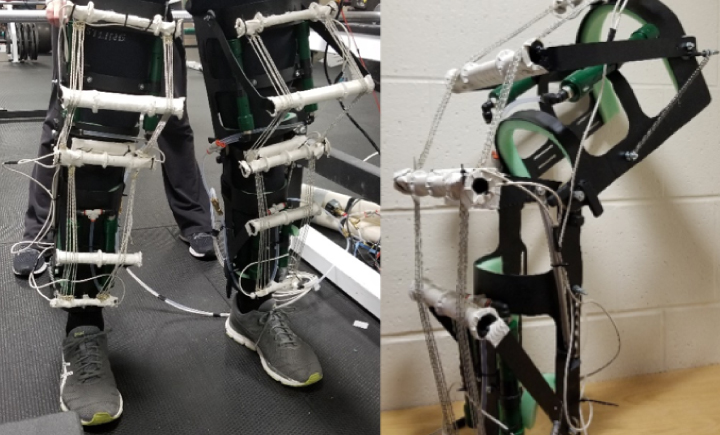Binghamton University students’ senior design projects to assist people and canines
The projects completed by biomedical engineering students range from a stress-measuring device for equine therapy to an ALS support device for an artist, dancer and puppeteer.

Students from the Binghamton University Biomedical Engineering Department will be presenting their senior capstone projects from 8:20 a.m.-noon Thursday, May 3, in the Center of Excellence, Room 2011, at the Innovative Technologies Complex.
From a modified jumperoo for a young girl with cerebral palsy to an accessible, dual-track conveyor system that will allow local company AVRE to hire three more legally-blind employees, the senior projects provide solutions for a wide variety of needs.
Below is a schedule of the presentations as well as a brief description of each project:
8:20 a.m. – Waste to Wealth: The students build something to melt down used plastic in order to produce a new, useful product. The machine was built for the coastline town of El Charcón in El Salvador to help reduce pollution.
8:40 a.m. – Body-on-a-chip: Instead of needing to test pharmaceuticals on human subjects, it may be possible to use a body-on-a-chip in the future. These devices are low-cost and have a realistic physiological flow pattern that can be useful for toxicology studies.
9:00 a.m. – Exoskeleton Leg Muscles: This project is a collaboration between biomedical engineering, mechanical engineering and electrical engineering students. The team developed a leg brace using artificial muscle fibers constructed from nylon.
9:20 a.m. – Drip Flow Reactor: Eczema affects 13 percent of children in the United States, but the cause is unknown. The drip flow reactor is a way to study the mechanical effects of Staphylococcus aureus bacteria, which is a characteristic of the disease.
9:40 a.m. – Lift Ramp for Children with Disabilities: This project included students from biomedical engineering, mechanical engineering and industrial and systems
engineering. It was done for the Southern Tier Activity Center, an institution that provides sensory experiences to those who are impaired. In particular, the
center has an LED, color-changing dance floor that was in need of a small ramp to make it accessible.
10:00 a.m. – Equine Therapy Stress Measurements: The device developed can measure stress levels without the need for an extensive laboratory. It will be used by Fargnoli Farms to measure changes in the stress levels of patients after undergoing equine therapy.
10:20 a.m. – Modified Jumperoo: A young girl with cerebral palsy will now have a custom jumperoo with a feeding tube and a drainage bag. The jumperoo will help her gain leg strength and keep her posture upright.
10:40 a.m. – ALS Support Device: An artist with ALS has struggled to continue activities she once loved, such as dancing and puppetry. The created device supports her weight with her feet just touching the ground and allows her to move in all directions and spin around.
11:00 a.m. – Intermission
11:20 a.m. – NYSID AVRE Project: This project recently won first prize at the CREATE (Cultivating Resources for Employment with Assistive Technology) Assistive Technology Competition. The team built a way to have an accessible, dual-track conveyor belt built for AVRE’s paper processing plant that will allow the company to hire at least three more legally blind employees.
11:40 a.m. – Solar-Powered Hydrotherapy Unit for Canine Rehabilitation: The team built a solar-powered hydrotherapy unit for Willow’s Wings Animal Sanctuary and Rescue after a previous version had deteriorated. The student’s project was built with long-term use in mind.
All presentations are free to attend and open to the public.
For more details, contact Biomedical Engineering Capstone Project Advisor and Distinguished Service Professor George Catalano at catalano@binghamton.edu or 607-777-4881.

